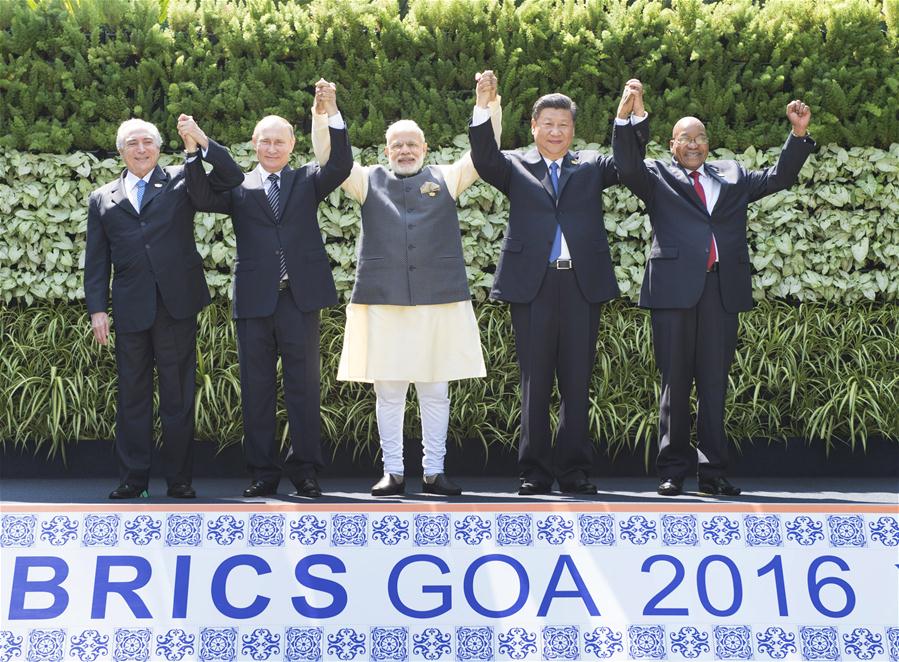The emerging-market bloc of BRICS, which groups Brazil, Russia, India, China and South Africa, issued here Sunday a joint declaration after a leaders’ meeting, looking to play a bigger role in and contribute more to the global governance system.
The Goa Declaration was a result of the eighth BRICS summit that was held on Oct. 15-16 in the western Indian state of Goa, under the theme of “Building Responsive, Inclusive and Collective Solutions.”
Chinese President Xi Jinping, Russian President Vladimir Putin, Brazilian President Michel Temer, Indian Prime MinisterNarendra Modi and South African President Jacob Zuma attended the meeting.
The document said the BRICS members expressed satisfaction with the approval of the first batch of loans by the New Development Bank (NDB), particularly in the renewable energy projects in BRICS countries, and with the NDB’s issuance of the first set of green bonds in RMB, as well as the initiation of BRICS Contingent Reserve Arrangement (CRA) that has strengthened the global financial safety net.
Noting that BRICS countries represent an influential voice on the global stage, the leaders extended gratitude to UN Secretary-General Ban Ki-moon for his contribution in the past 10 years and congratulated Antonio Guterres on his appointment as the next UN chief, pledging continuous support for the world body.
On the UN’s 2030 Agenda for Sustainable Development, the declaration urged developed countries to honor their commitments to achieve 0.7 percent of gross national income commitment for official development assistance to developing countries, adding that those commitments play a crucial role in the implementation of the sustainable development goals.
The five BRICS leaders, who just met last month in the eastern Chinese city of Hangzhou when China hosted the 11th summit of the Group of 20 (G20) major economies, welcomed the G20 Action Plan on the 2030 Agenda adopted during the Hangzhou Summit and committed to its implementation by taking bold transformative steps through both collective and individual concrete actions.
Commending China for the successful hosting of the Hangzhou summit and its focus on innovation, structural reform and development as drivers of medium and long term economic growth, the BRICS leaders emphasized the importance of the implementation of the Hangzhou summit’s outcomes, which will foster strong, sustainable, balanced and inclusive growth, contribute to improved global economic governance, and enhance the role of developing countries.
The bloc pledged to enhance consultations and coordination on the G20 agenda, especially on issues of mutual interest to the BRICS countries, and promote issues of importance for the emerging market and developing economies.
The BRICS countries will continue to work closely with all G20 members to strengthen macroeconomic cooperation, promote innovation, as well as robust and sustainable trade and investment to propel global growth,improve global economic governance, enhance the role of developing countries, strengthen international financial architecture, support industrialization in Africa and least developed countries, and enhance cooperation on energy access and efficiency, said the document.
On the International Monetary Fund (IMF)’s reform, the bloc reaffirmed its commitment to a strong, quota based and adequately resourced IMF.
Noting that borrowed resources by the IMF should be on a temporary basis, the BRICS countries said they remain strongly committed to supporting the coordinated effort by the emerging economies to ensure that the 15th General Review of Quotas, including the new quota formula, will be finalized within the agreed timelines, so as to ensure that the increased voice of the dynamic emerging and developing economies reflects their relative contributions to the world economy, while protecting the voices of least developed countries, poor countries and regions.
The declaration welcomed the inclusion of the RMB into the Special Drawing Rights currency basket on Oct. 10, and urged advanced European economies to meet their commitments to cede two chairs on the Executive Board of the IMF.
On the security front, the bloc strongly condemned the recent attacks against some BRICS countries, and strongly condemned terrorism in all its forms and manifestations, while stressing that there can be no justification whatsoever for any acts of terrorism, whether based upon ideological, religious, political, racial, ethnic or any other reasons.
The bloc agreed to strengthen cooperation in combating international terrorism both at the bilateral level and at international fora, and called on all nations to adopt a comprehensive approach in combating terrorism.
On environment protection, the BRICS countries welcomed the Paris Agreement and its imminent entry into force on Nov. 4. They urged developed countries to fulfill their responsibility toward providing the necessary financial resources, technology and capacity building assistance to support developing countries with respect to both mitigation and adaptation for the implementation of the Paris Agreement.
They also emphasized that the comprehensive, balanced and ambitious nature of the Paris Agreement reaffirms the principles of the UN Framework Convention on Climate Change, including the principle of equity and common but differentiated responsibilities and respective capabilities, in light of different national circumstances.
India, South Africa, Brazil and Russia conveyed their appreciation to China for its offer to host the Ninth BRICS Summit in 2017 and extended their full support, said the declaration.
This year marks the 10th anniversary of the BRICS cooperation mechanism, which gathers the world’s five major emerging economies.
The bloc’s members have seen their cooperation growing over the past decade, especially the establishment of the NDB and the CRA in 2014.
Despite economic headwinds in the BRICS countries and external skepticism about whether the bloc is losing its power over recent years, the IMF said earlier this month in its latest issue of World Economic Outlook that in emerging market and developing economies, the 2016 growth will accelerate for the first time in six years.
